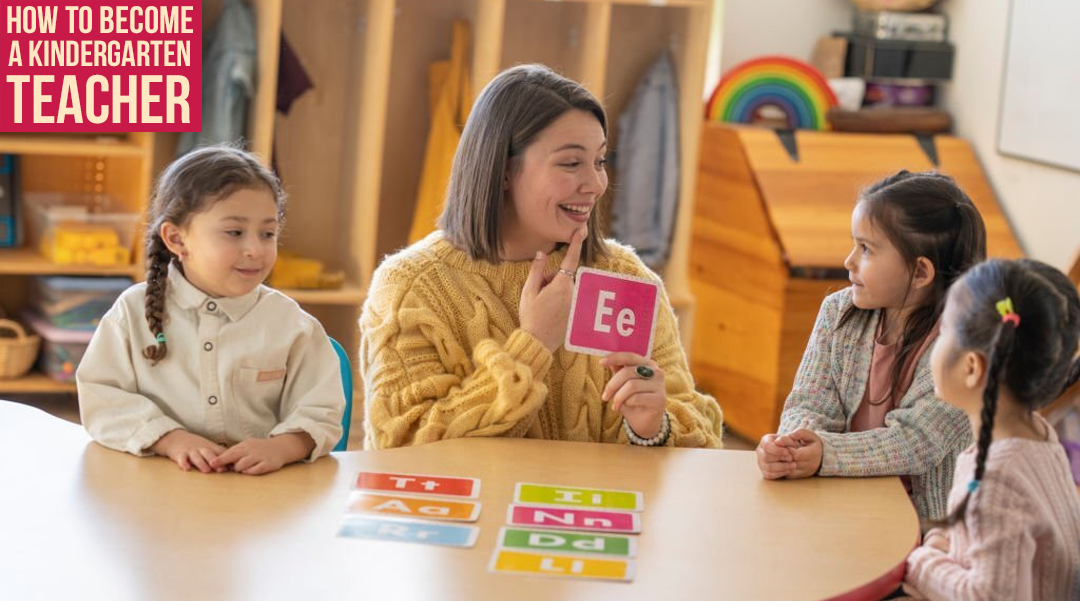Your Cart is Empty
- Ornament 🔥
- Gift for Family 🏠❤️
-
Pet
-
Memorial
-
Products
-
Home & Garden
-
Accessories
- Happy Customers ❤️
Unlocking the Path: How to Become a Preschool Teacher
September 08, 2023 7 min read

Are you an aspiring educator with a heart full of enthusiasm and a passion for nurturing young minds? Do you have a knack for turning everyday moments into valuable learning experiences? If so, then becoming a preschool teacher might be the perfect career choice for you. In this comprehensive guide, we'll navigate through the winding path of how to become a preschool teacher, shedding light on the qualifications, training, and skills you need to succeed.
Contents
1. Lay the Foundation

-
Earn a High School Diploma or Equivalent
Graduating from high school is the first milestone on your path to becoming a preschool teacher. This foundational education provides you with essential skills like reading, writing, and basic math, which are vital for effectively communicating and teaching young children. Additionally, it sets a strong educational precedent for the children you will later educate. -
Build Strong Communication Skills
Effective communication is the bedrock of teaching, especially when working with young children. You'll need to communicate not just with your students but also with parents and colleagues. This includes listening attentively to children's questions and concerns, speaking clearly and concisely to convey instructions, and fostering an environment where open communication is encouraged. Developing these skills early will serve you well in your future career. -
Gain Experience with Children
Volunteering or working part-time at daycare centers, summer camps, or after-school programs is an invaluable step on your journey to becoming a preschool teacher. This hands-on experience allows you to witness firsthand the dynamics of working with children and understand the challenges and joys of early childhood education. It also helps you assess your own suitability for the profession, giving you a taste of the responsibilities and rewards that lie ahead.
During this experience, you'll learn to connect with children on a personal level, engage them in educational activities, and manage their behavior effectively. These practical skills are essential for building a successful career as a preschool teacher. Additionally, the relationships you develop with children during this time can be incredibly rewarding and serve as motivation for your future endeavors in the field of early childhood education.
In summary, the foundation you lay in high school, coupled with strong communication skills and hands-on experience with children, provides you with the essential building blocks necessary to embark on your journey to becoming a preschool teacher. These early steps will shape your understanding of the profession and prepare you for the educational challenges and rewards that lie ahead.
2. Choose the Right Educational Path

-
Pursue an Early Childhood Education Degree
Enrolling in a reputable college or university offering an early childhood education program is a critical step in your journey to becoming a preschool teacher. These programs are specifically designed to equip you with the knowledge and skills required to excel in the field. During your coursework, you'll delve deep into subjects like child development, curriculum planning, and effective teaching methods. You'll learn how to create engaging lesson plans, foster a positive learning environment, and tailor your teaching approach to meet the unique needs of young children.Obtaining an associate's or bachelor's degree in early childhood education not only enhances your qualifications but also demonstrates your commitment to providing high-quality education to preschoolers. Many employers prefer candidates with formal education in the field, making it an essential credential for career advancement.
-
Gain State Licensure or Certification
The requirements for licensure or certification as a preschool teacher vary by state, so it's crucial to research and understand the specific mandates in your location. Typically, you'll need to complete the necessary exams or coursework and meet specific criteria to obtain this credential. Some states may also require background checks and fingerprinting to ensure the safety and security of the children under your care.Acquiring state licensure or certification not only satisfies legal requirements but also validates your competence as a preschool teacher. It assures parents, guardians, and employers that you meet the established standards for early childhood education, instilling trust in your abilities.
-
Consider Specializations
Early childhood education offers various specialized areas that allow you to tailor your career to specific interests or demographics. Exploring these options can enrich your expertise and open up unique career opportunities. For instance, you might choose to specialize in special education, equipping you to work with children who have diverse learning needs. Alternatively, you could delve into the Montessori method, focusing on a child-centered, hands-on approach to teaching.
Specializations not only distinguish you as an expert in a particular field but also enable you to connect with a specific age group or population that resonates with your passion. They provide a niche within the broader field of early childhood education, allowing you to make a more profound impact on the children you serve.
In summary, selecting the right educational path involves pursuing formal education in early childhood education, obtaining state licensure or certification, and considering specialized areas that align with your interests and career goals. These steps not only enhance your qualifications but also allow you to shape your future as a preschool teacher in a way that resonates with your unique passions and skills.
3. Develop Essential Skills

-
Patience, Patience, Patience!
Patience is an indispensable trait for any preschool teacher. Young children can be unpredictable, and they often require repeated explanations and guidance as they navigate the world around them. Cultivating patience means maintaining a calm and composed demeanor even in challenging situations. It means taking the time to understand a child's perspective and providing the support they need to thrive. Patience allows you to build trust with your students, create a safe learning environment, and foster their independence. -
Creativity and Imagination
Preschool teaching is all about creativity and imagination. You'll be responsible for designing lessons and activities that capture the imagination of young learners. Whether you're exploring colors through finger painting or embarking on a pretend journey through space, your ability to infuse creativity into your teaching methods is what will make learning fun and engaging for children. It's about thinking outside the box, encouraging curiosity, and turning everyday moments into exciting adventures. -
Flexibility and Adaptability
Flexibility and adaptability are vital skills for a preschool teacher. No two days in the classroom are the same, and unexpected situations can arise at any moment. Being flexible means adjusting your plans and expectations to meet the evolving needs of your students. It means embracing change and remaining open to new ideas and approaches. Adaptability is what allows you to tailor your teaching style to the individual needs of each child, recognizing that every student is unique and may require different forms of support and guidance. -
Empathy and Compassion
Empathy and compassion are at the heart of effective teaching. Understanding that each child comes from a different background and has their own set of experiences and challenges is crucial. Empathy allows you to connect with your students on a deeper level, recognizing their emotions and providing a supportive and nurturing environment. Compassion drives you to be sensitive to their needs, to be a source of comfort when they're upset, and to celebrate their achievements with genuine enthusiasm. It's these qualities that create a sense of security and trust, enabling children to flourish in your care.
In summary, developing essential skills as a preschool teacher means cultivating patience to navigate challenges, infusing creativity into your teaching methods, embracing flexibility and adaptability to cater to diverse needs, and nurturing empathy and compassion to create a caring and supportive learning environment. These skills are the bedrock of your success in the classroom and form the basis of meaningful connections with the young minds you guide.
4. Gain Practical Experience

-
Student Teaching or Internships
Student teaching or completing internships in an early childhood education setting is an essential part of your journey to becoming a preschool teacher. This hands-on experience allows you to bridge the gap between theory and practice. You'll work under the guidance of experienced educators, observing their teaching methods, and gradually taking on more responsibilities as you gain confidence. This immersive experience not only prepares you for the challenges of a real classroom but also helps you build a portfolio of practical skills and teaching strategies.During student teaching or internships, you'll have the opportunity to interact with children, plan and execute lessons, and address the day-to-day challenges that teachers face. It's a valuable time for receiving feedback, refining your teaching style, and learning to adapt to the unique needs and personalities of your students.
-
Seek Employment
Transitioning from student teaching to seeking employment as a preschool teacher is a significant step. While entry-level positions may not offer the same level of autonomy as lead teaching roles, they provide a platform to apply your knowledge and skills in a real-world setting. As you work alongside experienced educators, you'll continue to refine your teaching techniques and classroom management abilities.Working as a preschool teacher allows you to develop a deeper understanding of the administrative aspects of education, such as record-keeping, parent communication, and curriculum planning. It's a chance to put your creative lesson plans into action, witness the progress of your students, and learn how to effectively manage a classroom.
-
Networking and Professional Development
Joining professional organizations such as the National Association for the Education of Young Children (NAEYC) is a valuable step in your professional growth. These organizations offer opportunities for networking, mentorship, and staying informed about the latest trends and research in early childhood education. Attend conferences, workshops, and seminars to expand your knowledge and connect with like-minded educators.Engaging in professional development not only enhances your teaching skills but also demonstrates your commitment to ongoing improvement. It's a way to stay inspired and motivated in your career, learning from experts and sharing your own experiences with others in the field.
In summary, gaining practical experience as a preschool teacher involves completing student teaching or internships to bridge the gap between theory and practice, transitioning to employment to apply your skills in a real classroom, and engaging in networking and professional development to stay connected and informed in the field. These experiences are instrumental in shaping you into a competent and confident preschool teacher.
5. Conclusion

Becoming a preschool teacher is a fulfilling and rewarding journey that requires dedication, education, and a genuine love for children. By following these steps and continuously striving to improve your skills, you can embark on a path that not only shapes the future of young minds but also enriches your own life. So, are you ready to take the first step in becoming a preschool teacher and making a lasting impact on the lives of children?
Related articles in Teacher

Unlocking Success: How to Ask a Teacher for a Letter of Recommendation
September 08, 2023 7 min read
Explore the ultimate guide to becoming an elementary school teacher, from qualifications to practical tips, and embark on a journey to shape young minds.
Read More
Mastering the Path: How to Become an Elementary School Teacher
September 08, 2023 6 min read
Explore the ultimate guide to becoming an elementary school teacher, from qualifications to practical tips, and embark on a journey to shape young minds.
Read More
 Track Order
Track Order